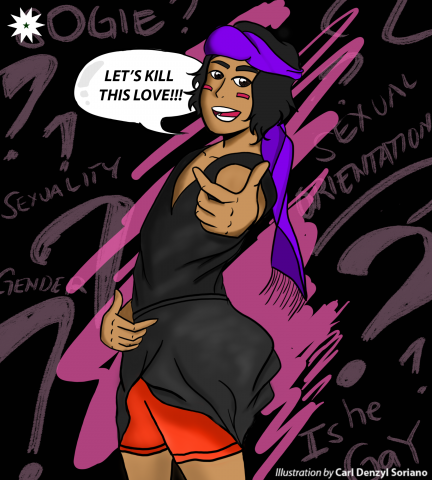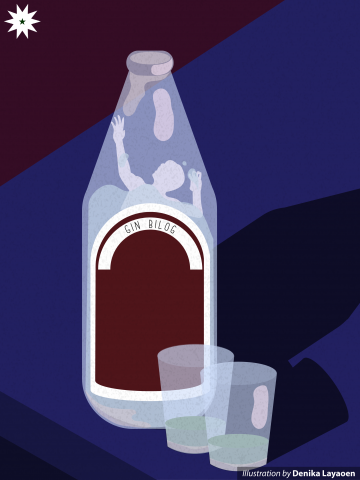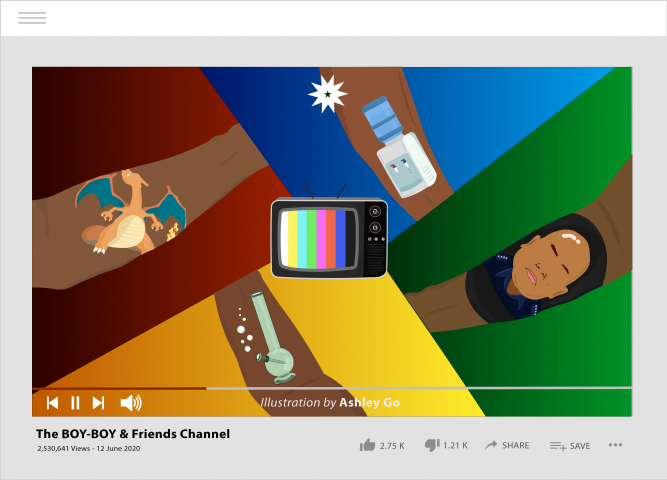TheVirgin Labfest (VLF) is back and better than ever. Since its inception in 2005, the annual festival, normally held at the Cultural Center of the Philippines, has been the birthplace of plays crafted by both veteran and newcomer Filipino playwrights. The festival has never shied away from boldness, consistently staying true to its tagline of staging “untried, untested, unstaged” plays by experimenting with unconventional themes.
However, this year presented a new challenge: due to the prohibition of mass gatherings, the plays could not be staged the usual way. Instead, they were going to have to make do by performing the plays in their homes and airing these via Zoom. Although pressed for time and spatially-constrained, the showrunners remained undaunted. In the words of festival director JK Anicoche as he commented on this year’s theme, Kapit, “Patuloy na kumapit sa pag-asa at sa paglikha.”
(Keep holding on to hope and creativity.)
Doggy, Glenielle
From its title to its premise, Doggy promises scandal. The brainchild of playwright Dustin Celestino and director Roobak Valle, the 45-minute play revolves around a couple’s clashing views on the titular position for intercourse. However, the play goes well beyond titillation and offers an incisive look at the breakdown of a relationship.
Celestino’s fast-paced script is rife with no-holds-barred dialogue, chewing on meaty themes with gusto—albeit a little heavy-handed at times. However, it truly comes alive through the actors’ performances; real-life husband and wife Chrome Cosio and Che Ramos-Cosio portray newly-engaged Mark and Jane, who argue about the latter’s aversion to the aforementioned position. As the pair’s squabble slowly turned into a nasty fight, the Cosios’ intense, emotional delivery made the sizable difference between a luminous performance in the vein of Who’s Afraid of Virginia Woolf and a raunchy skit in a late-night gag show. Notably, Ramos-Cosio’s Jane is never sexualized nor trivialized during the play—an important distinction from the usual media tackling the subject matter.
Inside the four walls of their bedroom, what started out as a small argument becomes an examination of society’s sexism and double standards. The personal matters eventually define the way Mark and Jane view the world and themselves—blurring the line between public and private. Intimate and searing, Doggy is an intriguing piece that offers so much more than sizzle.
Rating: 3.5/4.0
Titser Kit, Magz
Being a high school student can be tough; but for someone like Patrick, things have gone from bad to worse. Titser Kit is playwright Jobert Grey Landez and director Adrienne Vergara’s haunting gem, featuring the state of Bakwit schools and the trauma faced by the Lumad community.
Taking place in his new school’s bodega, Patrick is at risk of being punished by the school principal. Fear kicks in until Titser Kit comes by to comfort his student. Although the plot unfolds to be deceptively simple on the surface, it unpacks multiple layers of glee, regret, and fear.
Primarily shot in black and white, the characters’ troubles are interspersed with their memories of the mountains, vividly depicted through Patrick’s colorful child-like drawings—offering both the characters and the viewers an escape from their realities. The lack of extravagant plot, setting, and visuals makes this play a standout in the festival; it’s beautifully down-to-earth.
Landez’s script is perfectly translated through the personal and intense exchange between JM Salvado and Io Balanon as Patrick and Titser Kit, respectively, creating a heartwarming exposition. The characters’ code-switching between Obo-Manobo and Filipino demonstrated their level of intimacy with each other, yet still ensured that the audience could understand the story.
Timeless themes of discrimination, oppression, and privilege radiate throughout the play. As the narrative slowly reaches its climax, viewers get to understand the extreme fear that these indigenous groups must live through daily. Titser Kit ends ambiguously—a chilling reminder of the ongoing plight of the Lumad community.
Rating: 4.0/4.0
Blackpink, Sabrina

Drawing inspiration from a popular Korean pop group of the same name, Blackpink promises a charming show for those who harbor similar fixations for the song, Kill This Love. Written by Tyron Casumpang and directed by Jethro Tenorio, the play unravels the complexities of the gender spectrum with clever jest, challenging our idea of masculinity one dance step at a time.
Blackpink had the makings of a play of another standard. It challenges its characters to go a step beyond embracing the bakla and tomboy—pushing them to further explore themselves and their sexual orientation, gender identity, and expression.
Giving a dedicated performance, Noel Comia Jr. shines as the bubbly and lovable Bunso, who is doted on by Tatay, his father and an LGBTQ+ ally. Jonathan Tadioan’s stellar delivery of lines and the casts’ lively banter charge up the dialogue, dazzling with wit and catching the audience off guard with its use of subversion.
Unfortunately, Blackpink fails to sustain this momentum. The jokes lose their charm halfway through the show’s runtime. The engaging premise we fell in love with is sidetracked, and the events that follow are jarring and questionable. When the family eventually yields to Bunso’s request, the dialogue falls apart, and the resolution feels incomplete.
When the end credits roll, it is Kill This Love that we remember and not the story—nor what otherwise could have been a powerful message.
Rating: 2.5/4.0
Gin Bilog, Rafael

Gin Bilog starts out as a rather simple display of what a typical inuman would be like—gin on the table, a videoke machine at the side, and lots of foul language. In playwright Luisito Nario and director James Estrada’s hands, however, the inuman session becomes more than just a place for drinks.
As the characters start taking shots by the dozen, the glossy veneer of merrymaking slowly chips away, making room for their incredibly painful backstories to come to light. Rhon Mercado’s witty performance as Entong, coupled with Buboy Villar’s Dune and Lovely Abella’s Lorna, sets up a convincing dynamic of friends who have known each other for years.
However, the facades they maintain to deal with the heavy-hitting realities of life start to crumble, and their vulnerabilities start to show. But these vulnerabilities mean exploitation, the play seems to suggest as it nears its conclusion. With their lives in shambles, they drink in hopes of escaping reality, but in the end, never manage to come back.
Gin Bilog, much like its characters, is flawed. Behind the humor and absurdity is a convoluted and rushed plot. Despite being divided into three acts, the story felt forced to wrap up in the final segment. Further, there was little creative use of the online platform unlike the other plays shown in the festival.
Rating: 2.5/4.0
Boyboy and Friends Channel, Magz

Experience director Joshua Tayco’s roller coaster ride: Boyboy and Friends Channel. Over the top and larger than life, the boisterous opening theme is accompanied by laugh tracks and applause as it introduces the eponymous Boyboy and his buddies Greg, Randy, and Dennis. The production even takes advantage of Facebook’s live comment section to simulate the fictional YouTube channel’s live comments.
Anthony Kim Vergara’s witty script is filled with dozens of pop culture references and Filipino vlogger stereotypes—from reminding viewers to “like, share, comment, and subscribe” to using sarcasm and caustic wordplay. The play’s comedic timing doesn’t just rely on the script, though; the actors’ clever volleying also made the show an amusing watch. Boyboy, played by Norbs Portales, stands out as the hilarious star of the channel, while Nicco Manolo’s Greg and Anthony Falcon’s Dennis showed off their stellar dramedy chops.
Unfortunately, the play’s only strong point is its raw comedy. Its plot is chaotic: the first half is draggy; the conflict is only introduced midway; and the story initially bears no clear direction. Though the play dives into serious matters—such as the gruesome effects of unemployment, negative facets of influencer culture, and viewer preference for rowdy slapstick videos over informative and substantial content—these are ultimately overshadowed by the ridiculousness of Boyboy and his friends.
This farce serves as a reminder that content creating isn’t always what one expects. Boyboy and Friends Channel instead leaves viewers to ponder how this process could change one’s ideals and reputation in the long run.
Rating: 3.0/4.0
This ends part one of The LaSallian’s review of this year’s Virgin Labfest featured works. The remaining plays are reviewed in part two.
